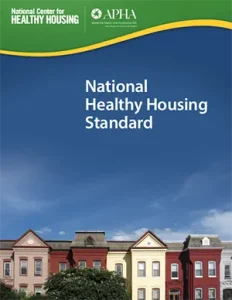 The National Center for Healthy Housing (NCHH) and the American Public Health Association (APHA) created this evidence-based National Healthy Housing Standard as a tool to reconnect the housing and public health sectors and as an evidence-based standard of care for those in the position of improving housing conditions. The publication is drawn from the latest thinking in the fields of environmental public health, safety, building science, engineering, and indoor environmental quality.
The National Center for Healthy Housing (NCHH) and the American Public Health Association (APHA) created this evidence-based National Healthy Housing Standard as a tool to reconnect the housing and public health sectors and as an evidence-based standard of care for those in the position of improving housing conditions. The publication is drawn from the latest thinking in the fields of environmental public health, safety, building science, engineering, and indoor environmental quality.
The National Healthy Housing Standard provides health-based provisions to fill gaps where no property maintenance policy exists and also a complement to the International Property Maintenance Code and other policies already in use by local and state governments and federal agencies for the upkeep of existing homes. The Standard bridges the health and building code communities by putting modern public health information into housing code parlance. The Standard is written in code language to ease its adoption, although the authors anticipate that states, localities, and other users will tailor it to local conditions.
The Standard consists of seven chapters and a section of definitions. The annotated version of the Standard explains the public health rationale for each provision, and provides references and resources for more information. Individually and together, the Standard constitutes minimum performance standards for a safe and healthy home.
Click here to view the report.




